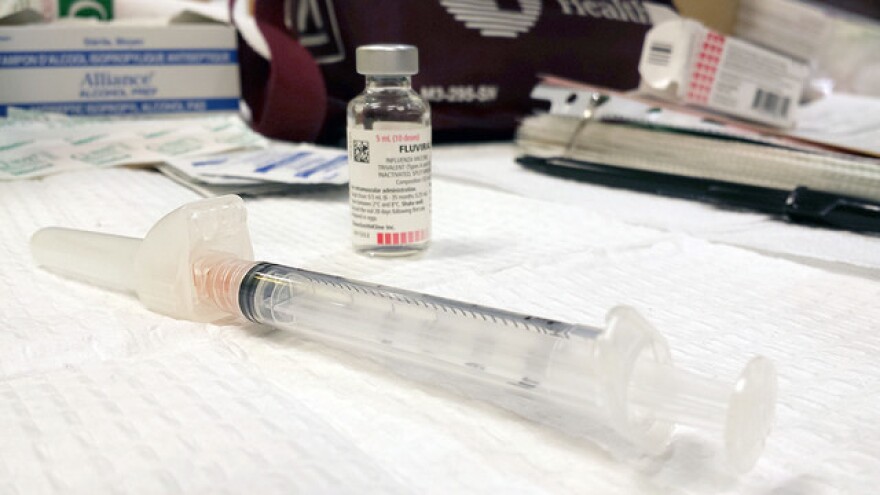Public Health officials say the flu has arrived in New Hampshire and will be here through April or May.
Every year, scientists create a new flu vaccine to try to outwit the highly mutable influenza virus.
That process begins in February, when the World Health Organization and Centers for Disease Control convene. “They decide by looking at worldwide surveillance date and deciding what types of strains are circulating around the world, so companies that produce vaccine can have it ready by end of summer, early fall,” said state epidemiologist Dr. Ben Chan on The Exchange. By the time a new vaccine has been manufactured, however, a new strain of flu may be circulating, creating a mismatch and diminishing the vaccine’s potency.
In a good year, the flu shot is about 60 to 70% effective. Last year was a relatively good match, at 63%, said Chan. Other years have not been as successful. “We have to wait to see how effective this year’s shot will be until some months into the flu season, ” he said.
Convincing patients to get an annual shot can be hard enough, Chan said, but the vaccine’s uncertain effects can make it an even harder sell.
“Most often people are motivated to get the flu vaccine if they’ve had a bad case of the flu,” said Dr. Elizabeth Clardy of Concord Family Medicine on The Exchange. Or if they have a family member or friend who might be especially vulnerable to becoming sick, she said.
“I’ll find often I’ll have someone who has turned me down flat until they have grandkids and they’ll be willing to get it because they want to protect the baby.”
For the most part, Clardy said, her patients have found the vaccine to be effective.
“Sometimes it’s hard to convince twenty-something to get a vaccine for an illness that’s inconvenient, but not terrible for them but really as a community if we all get the vaccine it helps protect the people who are at higher risk.”
Every year, the CDC estimates between 3,000 and 49,000 people die from influenza and influenza-related complications. “These are complications that can be prevented potentially by getting the flu vaccine,” Chan said.
The Mist Will Be Missed
The nasal spray vaccine was a favorite among children and parents, but the CDC now recommends the shot instead because the spray proved to be less effective, Chan said.
That has some public health officials concerned there will be a drop off in kids getting vaccinated. “I don’t know yet, but I can imagine that they may not want to be doing a lot of injections at schools. Whereas the flu mist was pretty well accepted,” Clardy said. “So we’ll just have to see.”
Generally, however, New Hampshire has good vaccination rates, Chan said. “We are a universal vaccination state. We provide vaccine for kids free of charge, for anybody. Any kid can walk into a doctor’s office, clinic… and they can get it for free if they don’t have insurance. “
Common Questions And Misconceptions About The Flu
How does the flu differ from the common cold?
Both are respiratory illnesses caused by different viruses. The common cold has multiple causes, multiple viruses. The flu is caused by the influenza virus and can cause a much more severe infection.
Cold symptoms: runny nose, cough.
Flu symptoms: muscle aches, high fevers, headaches, extreme fatigue in addition to some of the other systems like sore throat, runny nose and cough.
The Flu is also responsible for serious secondary infection, such as pneumonia. It causes significant disease every year.
Can you get the flu from the flu shot?
No. The flu shot is made from a dead virus. People will have some symptoms after the shot, pain or redness at the site of the shot, generalized fatigue, feeling rundown. That’s normal after the flu shot. That’s the body having an immune response to boost immunity to the flu.
I got my flu shot but I got the flu late in the flu season. Why?
It could be other viruses causing the illness. Or the vaccine could have failed.
Does it matter where you get the shot?
No. Wherever you can get it, get it. That could be from the visiting nurse, work, school, pharmacy, doctor’s office.
When exactly should I get the shot?
We have identified the flu virus in NH, so the time to get vaccine is now. The CDC recommends should get it by the end of October. The immunity is not long lasting. You’ll be protected for 6 to 8 months, possibly longer, possibly shorter. But if you get it now, it should last through April or May when the flu season is over.
How long am I infectious?
You’re infectious while you have symptoms. People actually are shedding flu virus for a day or two before they get sick. And then all while they’re sick – about five days – they shed the virus.
Who dies from the flu?
Young children, people over 65, and then people with other illnesses, such as cancer, HIV aids, lung and heart disease, diabetes, neuromuscular conditions, nursing home residents, pregnant women and also people who are severely obese.
I had the flu growing up and I did just fine. So do I need the vaccine?
Yes. Recommendations change over time. The goal is to try and get more and more people vaccinated, not fewer. It’s important not just to protect yourself but other people, the wider community.







